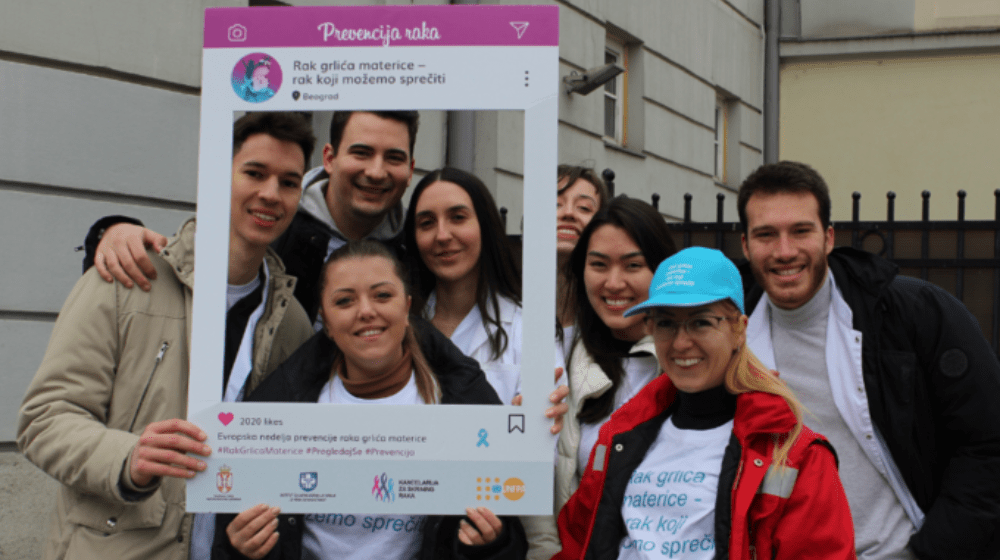Cervical cancer is the second most common cause of cancer death among women in Eastern Europe and Central Asia. Annually, more than 46,000 new cases of cervical cancer and 21,000 deaths are registered in this region.
The European Cervical Cancer Prevention Week, celebrated from 23 to 29 January this year, was marked in the Western Balkans.
The UNFPA Office in North Macedonia and the Ministry of Health organized a cervical cancer awareness campaign. This campaign aims to inform the public, specifically women, that this type of cancer could be almost entirely prevented through vaccination or screening, which can be done free of charge.
UNFPA North Macedonia and the Ministry of Health organized a panel discussion where the experts from the National Commission on Cervical Cancer Prevention, the National Commission on Immunisation, the E-Health Directorate, the University Clinic of Gynecology and Obstetrics - Mother Teresa, the Macedonian Association of Gynecologists and Obstetricians and Macedonian Medical Association, spoke about the current situation in the country, existing services, strengthening national partnerships and creating effective evidence-based measures.
The National Campaign for Prevention and Early Detection of Cervical Cancer, which continuously works on activities related to early detection of this disease and timely initiation of treatment, delivered a clear message that prevention saves lives.
In 2022, UNFPA BiH has been supporting the Ministries of Health of both Federation of Bosnia and Herzegovina (FBiH) and Republika Srpska (RS) in the development of the HPV Vaccination Program, on the example of the previously matured HPV Vaccination program of Canton Sarajevo (also supported by UNFPA BiH).
Cervical Cancer Awareness Week in 2023 served as a critical landmark for UNFPA BiH to promote the programs and foster continued cooperation with the relevant health authorities.
Throughout Cervical Cancer Awareness Week, UNFPA BiH also ensured wider reach to the general population through different media channels to raise awareness of the importance of cervical cancer prevention.
The Municipality of Pristina’s Directorate of Health, jointly with the Main Family Medicine Centre in Prishtina, organized a stakeholder roundtable on Cervical Cancer Prevention Week.
The discussions stressed the need for HPV vaccination for girls up to 15 years of age and for regular screening for women, which is increasingly provided in several Kosovo health centers. UNFPA has, over the years, provided substantial support and technical expertise in establishing the cervical cancer prevention program in Kosovo*.
Traditionally UNFPA in Serbia, in cooperation with the Institute for Public Health of Serbia, the Ministry of Health, and the Committee for International Cooperation of Medical Students - Serbia, organized educational and health-promotion activities in four dormitories in Belgrade that lasted throughout the week.
European Cervical Cancer Prevention Week began with a press conference on Monday, January 23, while public actions in student dormitories continued until Friday, January 27. Dr. Verica Jovanovic, director of the Institute for Public Health of Serbia "Dr. Milan Jovanović Batut," Prof. Dr. Ferenc Vicko, State Secretary of the Ministry of Health, Prof. Sanja Radojevic Skodric, director of the Republic Fund for Health Insurance, Prof. Dr. Ana Banko from the Institute of Microbiology and Immunology of the Faculty of Medicine in Belgrade, Dr. Jelena Mitrovic in front of HC Simo Milošević and Ms. Borka Jeremić, head of the UNFPA office in Serbia spoke at the press conference.
This year's celebration of the European Cervical Cancer Prevention Week is particularly significant because, since the middle of last year, the vaccine against HPV infection has been available for all girls and boys aged 9-19 from health insurance funds.
*All references to Kosovo should be understood to be in the context of United Nations Security Council resolution 1244 (1999).


